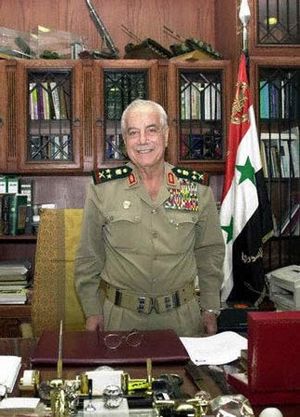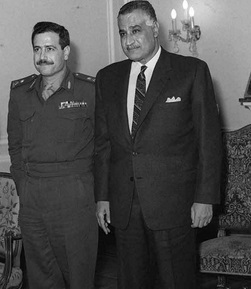Mustafa Tlass facts for kids
Quick facts for kids
Mustafa Tlass
مُصْطَفَى طَلَاس |
|
|---|---|

Mustafa Tlass in his office in Damascus
|
|
| Minister of Defense | |
| In office 22 March 1972 – 12 May 2004 |
|
| President | Nureddin al-Atassi (1968–1970) Ahmad al-Khatib (1970–1971) Hafez al-Assad (1971–2000) Bashar al-Assad (2000–2004) |
| Preceded by | Hafez Assad |
| Succeeded by | Hasan Turkmani |
| Chief of Staff of the Syrian Army | |
| In office 1968–1972 |
|
| Preceded by | Ahmad Suwaydani |
| Succeeded by | Yusuf Shakkur |
| Member of the Regional Command of the Syrian Regional Branch | |
| In office 28 September 1968 – 9 June 2005 |
|
| In office 4 April 1965 – December 1965 |
|
| Personal details | |
| Born |
Mustafa Abdul Qadir Tlass
11 May 1932 Rastan, French Syria |
| Died | 27 June 2017 (aged 85) Paris, France |
| Political party | Arab Socialist Ba'ath Party – Syria Region of the Arab Socialist Ba'ath Party Was a member of the original Ba'ath Party and its Syrian Regional Branch until 1966 |
| Relations | Nahed Tlass (daughter) Manaf Tlass (son) Firas Tlass (son) Abdul Razzaq Tlass (nephew) Akram Ojjeh (Son-in-law) Mansour Ojjeh (Grandson-in-law) |
| Military service | |
| Allegiance | |
| Branch/service | Syrian Army |
| Years of service | 1952–2004 |
| Rank | |
| Battles/wars | |
Mustafa Abdul Qadir Tlass (Arabic: مُصْطَفَى عَبْد الْقَادِر طَلَاس, romanized: Musṭafā ʿAbd al-Qādir Ṭalās; 11 May 1932 – 27 June 2017) was a Syrian senior military officer and politician who was Syria's minister of defense from 1972 to 2004. He was part of the four-member Regional Command during the Hafez Assad era.
Contents
Early life and education
Tlass was born in Rastan near the city of Homs to a prominent local Sunni Muslim family on 11 May 1932. His father, Abdul Qadir Tlass, was a minor Sunni noble who made a living during the Ottoman period by selling ammunition to the Turkish garrisons. On the other hand, members of his family also worked for the French occupiers after the First World War. His paternal grandmother was of Circassian origin and his mother was of Turkish descent. Tlass is said to also have some Alawite family connections through his mother. He received primary and secondary education in Homs. In 1952, he entered the Homs Military Academy.
Career

Tlass joined the Ba'ath Party at the age of 15, and met Hafez al-Assad when studying at the military academy in Homs. The two officers became friends when they were both stationed in Cairo during the period of 1958–1961 United Arab Republic merger between Syria and Egypt: while ardent Pan Arab nationalists, they both worked to break up the union, which they viewed as unfairly balanced in Egypt's favor. When Hafez al-Assad was briefly imprisoned by Nasser at the breakup of the union, Tlass fled and rescued his wife and sons to Syria.
During the 1960s, Hafez al-Assad rose to prominence in the Syrian government through the 1963 coup d'état, backed by the Ba'ath party. He then promoted Tlass to high-ranking military and party positions. In 1965, while he was Ba'athist army commander of Homs, Lieutenant Colonel Mustafa Tlass arrested his pro-government comrades. A 1966 coup by an Alawite-dominated Ba'ath faction further strengthened al-Assad, and by association Tlass. Tensions within the government soon became apparent, however, with al-Assad emerging as the prime proponent of a pragmatist, military-based faction opposed to the ideological radicalism of the dominant ultra-leftists. Syrian defeat in the 1967 Six-Day War embarrassed the government, and in 1968 al-Assad managed to install Tlass as new Chief-of-Staff. After the debacle of an attempted Syrian intervention in the Black September conflict, the power struggle came to open conflict.
In 1969, Tlass led a military mission to Beijing, and secured weapons deals with the Chinese government. In a move deliberately calculated to antagonize the Soviet Union to stay out of the succession dispute then going on in Syria, Mustafa Tlass allowed himself to be photographed waving Mao Zedong's Little Red Book, just two months after bloody clashes between Chinese and Soviet armies on the Ussuri river. The Soviet Union then agreed to back down and sell Syria weapons.
Under cover of the 1970 "Corrective Revolution", Hafez al-Assad seized power and installed himself as Dictator. Tlass was promoted to minister of defense in 1972, and became one of al-Assad's most trusted loyalists during the following 30 years of one-man rule in Syria. As'ad AbuKhalil argues that Mustafa Tlass was well-suited for Hafez al-Assad as a defense minister in that "he had no power base, he was mediocre, and he had no political skills, and his loyalty to his boss was complete." During his term as defense minister, Mustafa Tlass was functional in suppressing all dissent regardless of being Islamists or democrats.
On 19 October 1999, defence minister of China, General Chi Haotian, after meeting with Mustafa Tlass in Damascus to discuss expanding military ties between Syria and China, flew directly to Israel and met with Ehud Barak, the then prime minister and defence minister of Israel where they discussed military relations. Among the military arrangements was a 1 billion dollar Israeli Russian sale of military aircraft to China, which were to be jointly produced by Russia and Israel.
At the beginning of the 2000s, Tlass was also deputy prime minister in addition to his post as defense minister. He was also a member of Baath Party's central committee. His other party roles included the head of the party military bureau and chairman of the party military committee.
After Hafez al-Assad
The succession of Bashar al-Assad, Hafez's son, seems to have been secured by a group of senior officials, including Tlass. After the death of Assad in 2000, a 9-member committee was formed to oversee the transition period, and Tlass was among its members.
Whether true or not, Tlass and his supporters were viewed by many as opponents of the discreet liberalization pursued by the younger al-Assad, and to maintain Syria's hardline foreign policy stances; but also as fighting for established privileges, having been heavily involved in government corruption. In February 2002 in the Jordanian daily Al Dustour stated that Tlass submitted his letter of resignation to Bashar al-Assad, and was set to step down in July 2002. However, in 2004, Tlass was replaced by Hasan Turkmani as defense minister. It is also argued that Shawkat pushed for the removal of Mustafa Tlass. Tlass also quit the regional command in 2005.
Mustafa Tlass and his son, Firas, both left Syria after the revolt against Assad began in 2011. Mustafa Tlass left for France for what he described as medical treatment. Firas, a business tycoon, left Syria for Egypt in 2011, too. It is also reported that he is in Dubai.
In July 2012, Manaf Tlass, a Syrian officer and another son of Mustafa, defected from the Assad government and fled to Turkey and then to France.
Personal life and death
Tlass married Lamia Al Jabiri, a member of the Aleppine aristocracy, in 1958. His marriage secured his position among the traditional elite and enabled him to advance socially. They had four children: Nahid (born 1958), Firas (born 1960), Manaf (born 1964), and Sarya (born 1978). His daughter Nahid was married to Saudi millionaire arms dealer Akram Ojjeh, forty years her senior. She has lived in Paris since the onset of Syrian uprising. His younger daughter, Sarya, is married to a Lebanese from Baalbak.
Tlass was the only member of the Ba'ath government who took part in the traditional social establishment of Syria. His hobbies are said to include horseback riding, tennis, and swimming.
Tlass died on 27 June 2017 in Avicenne Hospital in Paris, France, at the age of 85.
Honours
National honours
- Syria:
 Order of the Umayyads (1st class)
Order of the Umayyads (1st class) Order of Civil Merit (1st class)
Order of Civil Merit (1st class) Order of Military Honor (1st class)
Order of Military Honor (1st class) Order for Bravery (1st class)
Order for Bravery (1st class) Order of Devotion (Special class)
Order of Devotion (Special class) Medal for Long and Impeccable Service (Special class)
Medal for Long and Impeccable Service (Special class) Medal for Preparation
Medal for PreparationOrder of Federation
 Commemorative Medal 'March 8'
Commemorative Medal 'March 8' Commemorative Medal 'October 6'
Commemorative Medal 'October 6'
Foreign honours
- Austria:
- Egypt:
- East Germany:
- Greece:
- Kazakhstan:
- Lebanon:
- North Korea:
- Pakistan:
- Russia:
- Soviet Union:
See also
 In Spanish: Mustafá Tlass para niños
In Spanish: Mustafá Tlass para niños

